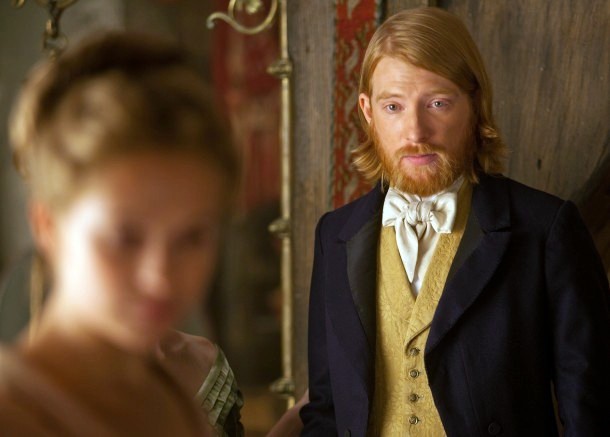The only reason why I liked Anna Karenina (after TooYoungToTeach got me to read it) was not because of Anna (BOO!), but Levin.

Levin's a nice guy. He's trying to work things out. He makes some mistakes. He attempts to rectify them. He's a pleasant fellow muddling through life to find his purpose, like most of us are.
I can't stand unpleasant characters. The vindictive, mean, and downright cruel do not interest me. One of the reasons why I can't tolerate Downton Abbey is Thomas, the spiteful, conniving once-footman (I don't know what his title is now).

But many do not share my preferences. Even Bookends questions, "Can a virtuous character be interesting?" According to Thomas Mallon:
. . . when it comes to literary characters, reader taste has generally followed the old saying: “Heaven for comfort; hell for company.” No one has ever preferred Amelia to Becky in “Vanity Fair,” or Melanie to Scarlett in “Gone With the Wind.”
Really? I can't stand Scarlett, and would wholeheartedly favor Melanie if not for her passionate racism.

Alice Gregory gets me:
But as anyone who has earnestly attempted it will admit, being good is to feel far more at odds with the world than being bad does. It is the cumulation of calculated social compromises, purposeful acts of communion, and meticulous emotional arithmetic. Commonplace wickedness, meanwhile, is seldom the result of anything more devious than inattention to the feelings and realities of other people. Living virtuously is hard. It takes generative intellectual work that is far more interesting than the defensiveness of “being bad.” I would rather consider the challenges that go into a consciously lived life than the inevitably hurtful products of a cruel one.
A truly radical 21st-century novelist wouldn’t ask us to see ourselves in made-up villains, and then, hopefully, revise our opinions of the real ones in our own lives. Rather, they would ask us to see the arduous and often acrobatic effort that goes into living a life of common decency. They would coerce us into believing that virtue is interesting and fun to think about and far more dazzling to encounter than malevolence.
In her 1947 book “Gravity and Grace,” Simone Weil wrote: “Imaginary evil is romantic and varied; real evil is gloomy, monotonous, barren, boring. Imaginary good is boring; real good is always new, marvelous, intoxicating.”
It's "unfashionable," Gregory writes, but "It’s time that goodness be shown in all its relentless torment and sacrifice."
Amen, sister!
3 comments:
I know you dislike Dickens anyway, but his heroes and heroines have a reputation for being bland and irritatingly pious. One reads Dickens for the supporting characters, not the heroes (or the plots). Although Pip in Great Expectations is at least supposed to be an annoying snob (I really need to re-read that now I'm old enough to understand it properly).
My brother's comment after reading GWTW (due to my recommendation because of his interest in the Civil War era, it was probably the only romance he'll ever read), was that as selfish of a person as Scarlett could be, at the end of the day she did what she needed to keep her family/home alive. They were all depending on her and if not for her, they wouldn't have made it. Which I can't disagree with.
As far as characters being "good" that isn't really important to me, as long as they are interesting. One of my favorite literary characters of all time is Gwendolyn from Daniel Deronda and her part of the first half of the book is titled "The Spoiled Child" quite aptly. She is totally spoiled and breaks people's hearts and uses them but she's so much more fascinating than the ultra dull Mirah.
DS: From my fuzzy high school memories, Pip is actually interesting because he starts out as a nice kid, then let's money go to his head, discovers his error, and sheepishly becomes a mensch again. I think. But Dickens virtuous characters were without depth, no struggle, just automatically full of mercy and kindness.
Anon: I do say that while Scarlett isn't likable, she is admirable; while the rest of the South finds her convention-defying actions to be unsupportable, she refuses to go hungry again just for form's sake. However, was there any upside to her being a brat before the war broke out? She was selfish before, and selfish after; nothing changes.
Okay, I really have to read "Daniel Deronda." I couldn't stand Gwen in the film adaptation, but you can see how she got there. A beautiful child who is favored by her timid mother along with the rest of the world. In the end, she is not so different than Scarlett; she does what she has to do for survival. Yet why was she horrible before the family fortunes go kaput?
But at the end she tries to become better. Scarlett just vows to track down Rhett.
Mirah, yet, goes through great hardship but it doesn't harden her. I don't know how dull she appears in the book, so I have to give that a read, but I liked her on film. Her quiet dignity compared to Gwen's loud obnoxiousness appealed to me.
Post a Comment